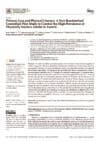Abstract
The multidimensional concept of physical literacy is fundamental for lifelong physical activity engagement. However, physical literacy-based interventions are in their infancy, especially among adults. Therefore, the purpose of this pilot study was to assess the association of a physical literacy-based intervention with changes in self-reported physical literacy among inactive adults. A non-randomized controlled study (2 × 2 design) was conducted, comparing pre- vs. postintervention. Twenty-eight inactive healthy participants in the intervention group (89% female, 53 ± 10 years) entered a physical literacy-based intervention once weekly for 14 weeks. The non-treated control group consisted of 22 inactive adults (96% female, 50 ± 11 years). Physical literacy was evaluated with a questionnaire encompassing five domains: physical activity behavior, attitude/understanding, motivation, knowledge, and self-efficacy/confidence. ANOVA models were applied to evaluate changes by time and condition. Following the intervention, significant improvements were seen for overall physical literacy and in four out of five physical literacy domains, including physical activity behavior, attitude/understanding, knowledge, and self-efficacy/confidence (all p < 0.01, Cohen’s d = 0.38–0.83). No changes by time x condition were found for motivation. The physical literacy-based intervention applied in this study may be a promising approach to help inactive adults to adopt an active lifestyle.



Responses